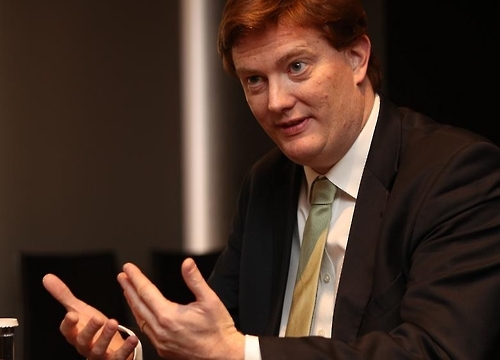South Korea will play a bigger role in Asia's investment in sustainable infrastructure through its experience of economic development and constant investment in basic facilities, a senior official at an international institution said.
"I would say that Korea is a very important member of our bank," Danny Alexander, vice president of the China-led Asia Infrastructure Investment Bank, said in an interview with Yonhap News Agency in Seoul Monday. "Korea's experience of the last 50 years of rapid economic development and progress to high standards is something which is a very important example for this region."
 |
Danny Alexander, vice president of the Asia Infrastructure Investment Bank, speaks in an interview with Yonhap News Agency in Seoul on Feb. 27, 2017. (Yonhap) |
The AIIB was formally launched on Jan. 16, with 57 founding members including South Korea, in a bid to promote economic growth in the Asian region by supporting infrastructure investment. South Korea has a 3.81 percent stake, the fifth largest among member countries.
He said the AIIB chose Jeju Island of South Korea for the venue of its second annual meeting and the first meeting outside of China in June, considering that the newly born bank is eager to learn from the country's experience and share it with other countries.
The first AIIB annual meeting was held in Beijing in June last year.
"At the annual meeting we will talk about how we can improve connectivity within Asia," said the official who visited Seoul in preparation for the June meeting in Jeju. "We will be talking about how we can help mobilize more private sector investment in infrastructure, because the funding gap in infrastructure in Asia is so huge, many trillions of dollars."
He said the AIIB's first year was successful as an international development bank, saying that the bank embarked on nine projects worth $1.7 billion in seven countries last year under the theme of "sustainable infrastructure" in Asia.
"In our first year, we have put in place our key policies, environmental policies and procurement policies to make sure that the bank operates at the very highest global standards," said the Scot, who had served as chief secretary to the Treasury between 2010 and 2015 in the British government.
Also, he said the AIIB is in close partnership with other multilateral lenders such as the World Bank and the Asian Development Bank to draw up well-prepared and beneficiary projects.
Out of nine projects funded by the AIIB last year, six are co-financed with the World Bank, the ADB and the European Bank for Reconstruction and Development.
"The scale of the tasks that we face in Asia and the need for infrastructure is huge. By working together, we can achieve those outcomes more effectively," said Alexander, refuting some reports that the AIIB was designed by China to work as a potential counterbalance to such US-led development banks.
"Co-financing is a very good thing not only for our bank but also for other institutions, because it enables us to share the risks of individual projects and to share the burden for preparing projects."
The vice president said the AIIB will increase its presence on the world stage in the coming years amid widespread trade protectionism throughout the world.
"I think the foundation of the AIIB is an example of how countries can cooperate even in these times when in some places international cooperation is being challenged," said the official.
"All around the world, people understand that infrastructure investment is vital to raising economic prosperity, to improving living standards and to tackling climate change. I think the AIIB may be a good example of how international cooperation can continue to flourish even in these modern times." (Yonhap)








![[Today’s K-pop] Blackpink’s Jennie, Lisa invited to Coachella as solo acts](http://res.heraldm.com/phpwas/restmb_idxmake.php?idx=644&simg=/content/image/2024/11/21/20241121050099_0.jpg)